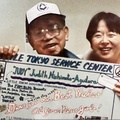Yudai is gone tonight, so I’m in charge again. The third night in a row. I’m tired; I notice some dark circles around my eyes this morning and apply a heavier layer of Shiseido concealer. I try to pretend that it magically works to transform me into a young woman full of vitality, but I can’t get away from the stark truth that I’m a forty-two year old divorcée with a slightly crooked front tooth and wrinkles on her forehead from too much worrying.
“Your boyfriend was here again for lunch,” Som, our bus boy and dishwasher, tells me as he checks over the place settings on our three tables and our curved sushi bar. We open in fifteen minutes and Carrie, our waitress and cashier, hasn’t arrived yet. Hector, our cook, is in the back and we can hear him cursing as a pan falls to the ground. He’s a first-time father and the lack of sleep has made him even grouchier than usual.
I continue to mix a dab of grated wasabi into some horseradish on the other side of sushi bar. I don’t know why Yudai insists that we even use real wasabi when most Americans have no idea that they’re really eating horseradish mixed with green food coloring. At least a fingertip’s worth of authenticity, Yudai says. That’s the least we can provide to our customers.
“Did you hear me—that man with the curly hair, Ray, was here for lunch and he was very sad that you weren’t around. I think that he will be back for dinner.”
“Oh yeah, that guy was here again. I think he’s really into you, Maki.” Carrie pulls off her Stanford sweatshirt to reveal her uniform.
“I didn’t even hear you come in. You are late.”
“I’m not late,” Carrie says, tightening her blonde ponytail. She then flips over our sign to Open. “I’m right on time.”
* * *
Yudai’s Corner is so small—I think the English word is “quaint”—and located in the far north part of the main street in Mountain View, that we know most of our regular customers. They are mostly men who work at one of the neighboring high-tech firms with some older retired couples. Yudai pretends to be different people on Yelp—I think they call it sockpuppeting—and purposely gives Yudai’s Corner bad ratings, mostly because he doesn’t want to be bothered by demanding foodies. He doesn’t even have a sign up. He says that he’s Yudai and it’s his corner, so a sign is not necessary. Yes, Yudai is a henna otoko, a strange chap. He wants to become a professional standup comedian. So he takes any volunteer opportunities out there, anywhere. He’s done his bit outside at Stanford Shopping Mall, a fish market, and even a high school. Tonight is at what is called an Optimist Club meeting, which makes sense, because Yudai is one of the most optimistic people that I know.
Only a person like Yudai would hire me as a sushi chef. In Japan, this would have never happened. A woman as a sushi chef? Never! Our hands are considered too warm to handle the rice. I can’t even remember other excuses I heard when I was a child in Wakayama.
At the bar tonight is a mechanical engineer at Hewlett-Packard, a software programmer from LinkedIn, and a marketer with Facebook. All three, I guess, are henna otoko. They choose not to socialize with their co-workers and eat at their corporate cafeterias. No, instead our little corner sushi bar has become their second home.
I’m arranging some salmon eggs on top of nigiri rice held together with nori, when the door opens. “I-rra-shaimase,” Som calls out. I somehow know who it is. Som directs Ray to a seat at the far side of the bar next to the door. I don’t know why, but my heart begins to pound.
“Welcome,” I say, bowing slightly.
“Maki,” he uses my name as a greeting.
Ray looks very different than my ex-husband, but there’s something similar about them. My ex-husband, Kurt, is tall, almost six-feet three, balding, with searing blue eyes. Ray, on the other hand, is about my height, five six, with a dark complexion and thick, curly hair. Both of them, though, have the same steady gaze. I like them looking at me.
“What will you have tonight?” I ask after Carrie serves him some piping hot tea.
“Omakase.”
This is the first time he leaves it up to me, the chef. I will not disappoint.
* * *
Over the course of this evening, I tell him too much. It could have been because he buys me some sake from Hokkaido. Soon I’m telling him about the seaside village in Wakayama that I’m from and my family’s cuttlefish business.
“You work so hard,” he then says abruptly. “Don’t you have any nights off?”
“Well, Mondays we are closed.”
“I’d like to take you out to dinner next Monday.”
It’s not like men haven’t asked me out on dates. But this is the first time in a very long time in which I want to say yes.
“I’ll have to check my schedule,” I tell him. I need to think this over.
He leaves his phone number and full name on a napkin. Ray DiPietro.
DiPietro. What kind of name is that, I wonder. It sounds beautiful, like the title of an Italian opera.
* * *
When I call him a few days later to tell him yes, he doesn’t seem surprised. He wants to pick me up from my apartment, but I decline. I need to take this slow. “Why don’t we meet at the sushi bar,” I suggest and he finally agrees.
Punctuality is very important to me, but tonight I’ve failed. I’ve applied my make-up two times and changed my clothing about five. I’m rusty at this. I haven’t gone on a date since I started seeing Kurt.
I see a black sedan in our tiny empty parking lot. It must be Ray.
I run over in my high heels, which I almost never wear. I hate to have anyone wait for me. I can see a silhouette of curly hair leaning against the headrest. He must have fallen asleep.
I knock gently on the side of the door. “Ray,” I call out, but the figure doesn’t stir.
“Ray,” I yell louder and still nothing.
Finally I reach for the door handle and pull the driver’s side door open.
And it is Ray. Only there’s bloody wound on his left temple. And his eyes are open but they certainly aren’t looking at me anymore.
© 2018 Naomi Hirahara





